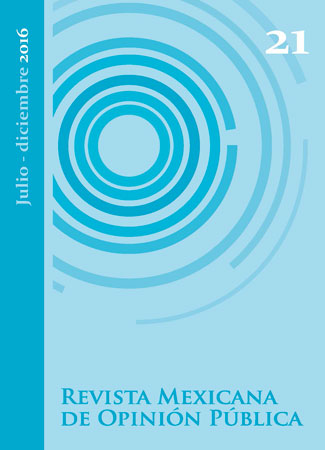The usefulness of surveys in predicting the vote. The second round of Argentina 2015
Main Article Content
Abstract
¿Is it possible to predict who will win an electoral race? ¿Which is the usefulness of public opinion surveys for that goal? This article seeks to respond this questions through the estimation of electoral results of 2015 Argentinian´s Presidential Election based on the information provided by Latin-barometer 2015, an annual survey run at the beginning of the year, 9 months before the election. The quantitative analysis (logistic regression) shows that final electoral results, as much the first as the second round (where Mauricio Macri, the challenger, was finally and surprisingly elected), could be predicted with the public opinion data included in that survey.
Article Details
Citas en Dimensions Service
References
ANSOLABEHERE, Stephen, Shanto Iyengar, Adam Simon y Nicholas Valentino, “Does Attack Advertising Demobilize the Electorate?”, American Political Science Review, vol. 88, núm. 4, Texas, Estados Unidos, 1994.
AUYERO, Javier, La política de los pobres, Cuadernos Argentinos Manantial, Buenos Aires, 1997.
BRUSCO, Valeria, Marcelo Nazareno y Susan Stokes, “Vote buying in Argentina”, Latin American Research Review, vol. 39, núm. 2, Latin American Studies Association, Maryland, Estados Unidos, 2004.
CATAIFE, Guido,“An Integrated Model of Vote Choice in Argentina, 2009”, Latin American Politics and Society, vol. 53, núm. 3, Universidad de Miami, Estados Unidos, 2011.
CAVALLO, Alberto, “Online and official price indexes: Measuring Argentina´s inflation, Journal of Monetary Economics, vol. 60,
núm. 2, Universidad de Rochester, Nueva York, 2013.
DOMÍNGUEZ, Jorge y James McCann, Democratizing Mexico. Public Opinion and Electoral Choices, The John Hopkins University Press, Londres, 1998.
DOWNS, Anthony, “An Economic Theory of Democracy”, Journal of Political Economy, vol. 65, núm. 2, The University of Chicago Press Journals, Chicago, Estados Unidos, 1957.
DRUCKMAN, James y Lawrence Jacobs, “Lumpers and Splitters: The Public Opinion than Politicians Collect and Use”, Public
Opinion Quarterly, vol. 70, núm. 4, Oxford University Press, Estados Unidos, 2006.
ERIKSON, Robert S. y Christopher Wlezien, “Are political markets really superior to polls as election predictors?”, Public Opinion Quarterly, vol. 72, núm. 2, Oxford University Press, Estados Unidos, 2008.
ESTRADA, Luis, “Determinantes y características de los independientes en México”, Política y Gobierno XIII, núm. 1, CIDE, México, 2006.
FIORINA, Morris, Retrospective voting in American National Elections, Yale University Press, Connecticut, Estados Unidos, 1981.
FLEITAS, D. W., “Bandwagon and underdog effects in minimal information elections”, American Political Science Review, vol.
, Texas, Estados Unidos, 1971.
GERVASONI, Carlos, “El impacto de las reformas económicas en la coalición electoral justicialista (1989-1995)”, Boletín SAAP,
año 4, núm. 6, Sociedad Argentina de Análisis Político, Argentina,1998.
GROSSI, Giorgio, La opinión pública. Teoría del campo demoscópico, Centro de Investigaciones Sociológicas, Madrid, 2007.
HARDMEIER, Sybille y Hubert Roth, “Towards a Systematic Assessment of the Impact of Polls on Voters: A Meta-analytical Overview and Theoretical Framework”, en la Conferencia: 54th WAPOR Annual Conference, Roma, 2001.
HENSHEL, Richard y William Johnston, “The Emergence of Bandwagon Effect: A Theory”, Sociological Quarterly, vol. 28, núm. 4, Midwest Sociological Society, Reino Unido, 1987.
INGLEHART, Ronald, Culture Shift in Advanced Industrial Society, Princeton University Press, Nueva Jersey, Estados Unidos, 1990.
JACOBS, Lawrence y Robert Shapiro, “Questioning the Conventional Wisdom on Public Opinion toward Health Reform”, Political Science and Politics, vol. 27, núm. 2, Cambridge University Press, Estados Unidos, 1994.
JORRAT, Jorge, “Las elecciones de 1983: ¿desviación o realineamiento?”, Desarrollo Económico, vol. 26, núm. 101, Instituto de desarrollo económico y social, Buenos Aires, Argentina, 1986.
KAVANNAH, Dennis, “Las encuestas de opinión pública”, Estudios Políticos, 53, Centro de Estudios Políticos, Santiago de Chile, 1994. Consultado en http://www.cepchile.cl/dms/archivo_1230_1368/rev53_kavanagh.pdf.
LAVRAKAS, P. J., J. K. Holley y P. V. Miller, “Public reactions to polling news during the 1988 presidential election campaign” en
Paul J. Lavrakas y Jack K. Holley (eds.), Polling and Presidential election coverage, SAGE, California, Estados Unidos, 1991.
LEIGH, Andrew, and Justin Wolfers, “Competing approaches to forecasting elections: Economic models, opinion polling and
prediction markets”, Economic Record, vol. 82, Economic Society of Australia, Australia, 2006.
LODOLA, Germán, “¿Cómo votamos los argentinos?, Revista SAAP, vol. 7, núm 2, Sociedad Argentina de Análisis Político, Buenos Aires, 2013.
LODOLA, Germán y Mitchell Seligson, Cultura política de la democracia en Argentina y las Américas: hacia la igualdad de
oportunidades, CIPPEC-Universidad de Vanderbilt -LAPOP, Buenos Aires, 2013.
MARSH, C., “Back on the bandwagon: The effect of opinion polls on public opinion”, British Journal of Political Science, vol. 15,
núm. 1, Cambridge University Press, Reino Unido, 1984.
PAGE, Benjamin y Robert Shapiro, “Effects on Public Opinion on Policy”, American Political Science Review, vol. 77 núm. 1,
Cambridge University Press, Texas, Estados Unidos.
PÉREZ Liñán, Aníbal, “La reversión del resultado en la segunda vuelta electoral. Una evaluación institucional del balotaje”, ponencia presentada en el Tercer Congreso Internacional de Latinoamericanistas en Europa, Ámsterdam, 3-6 de julio de 2002.
WORLD Bank, Datos macroeconómicos de Argentina, 2015. Consultado en http://datos.bancomundial.org/pais/argentina.

Revista Mexicana de Opinión Pública por Universidad Nacional Autónoma de México se distribuye bajo una Licencia Creative Commons Atribución-NoComercial-SinDerivar 4.0 Internacional.
Basada en una obra en http://revistas.unam.mx/index.php/rmop.


